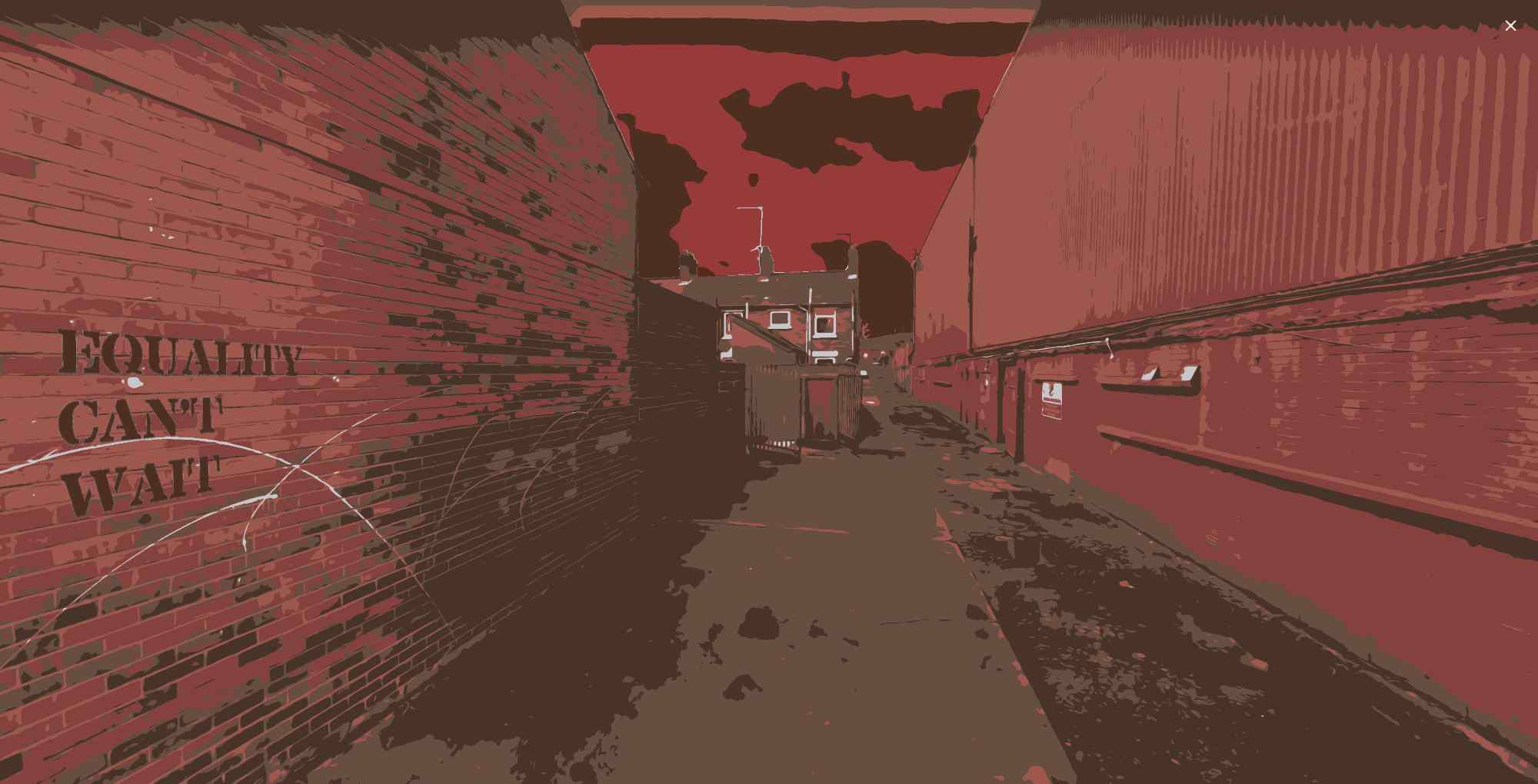
Policy Watch
An eye on policy changes in Ireland, the UK and beyond
Homelessness | Social Housing | The Situation of Private Tenants | Asylum Seekers and Refugee Accommodation | Nationality and Borders Bill
Homelessness
Housing authorities reversed a decision to close Belfast’s only homeless hostel for women, Regina Coeli House in West Belfast, following several months of protest by staff, their union and supporters. New data showed that the number of NI households in temporary accommodation rose by three quarters between January 2019 and late February 2022, to 3,579 households (including between them 3,763 children). Concerned Assembly members asked repeatedly (AQW 30248/17-22, AQW 29932/17-22, AQW 29990/17-22 and AQW 30195/17-22 etc) for information, attempting to establish the facts around temporary accommodation availability, use and expenditure across the north.
In March Simon Community NI and the Ulster University published findings on growing hidden homelessness amongst up to 110,000 people here and urged the authorities to increase the supply of social housing and to review the ‘priority need’ criteria for FDA status, among other matters.
The Museum of Homelessness’s Dying Homeless Project reported that deaths amongst homeless people – including rough sleepers and people in emergency accommodation – tripled in Northern Irelandbetween 2019 and 2021, from 107 to 325. This is a much higher rate than the UK as a whole, which also saw a rise (of 80%) in homeless deaths, from 710 in 2019 to 1,286 in 2021. This means that NI’s share of UK homeless deaths has risen from 15% in 2019 to 25% in 2021.
What is government policy in these areas? PPR responded to Housing Executive consultations on its proposed homelessness strategy and temporary accommodation action plan in the first quarter of 2022. While acknowledging some positive elements, PPR expressed concern that child homelessness continues to pass largely under the radar in these draft policies. It recommended that the way FDA criteria are applied in practice be interrogated to identify why some patently homeless people are being denied FDA status, or are deterred from even applying. Commitments to explore continued alternative accommodation support for people with No Recourse to Public Funds are welcome and will be followed closely. (Separately, PPR’s submission to the Department of Justice’s consultation to inform new strategies on violence against women and girls highlighted the increased risk of violence and exploitation for people with NRPF under the Home Office’s hostile environment policy.)
The Housing Executive presented its finalised homelessness strategy for 2022-27 and accompanying temporary accommodation action plan in March.
Social Housing
In the High Court in March, Mr Justice Humphries granted an applicant in housing need – known as JR204 – leave for judicial review to challenge a controversial vote by Belfast City Council’s planning committee to re-designate a large section of the Mackie’s site in west Belfast as parkland for a green way. The applicant’s solicitor called the decision "an important milestone”. The Mackies site is Belfast’s largest tract of vacant public land; campaigners argue that it should be used at least in part to meet the extremely high housing need in the area.
Communities Minister Deirdre Hargey announced a freeze in Housing Executive rent levels for 2022/23; however in response to numerous Assembly questions she clarified that the Department has no control over housing association rents. In March bereaved families were among demonstrators calling for a change to the Housing Executive’s tenancy succession policy for social homes. Following an MLA’s question it emerged that the Housing Executive has 300 acres of unused land with development potential.
The DFC allocated an additional £16m to the Housing Executive to implement its Tower Block Action Plan. PPR published FOI findings related to tower blocks and social housing planning in North Belfast.
The Situation of Private Tenants
Following consultation on a new ‘intermediate rent’ model of affordable housing at end 2021 – during which PPR expressed concern about the apparent failure to learn lessons from similar schemes elsewhere in the UK and peg rents to incomes rather than to market rates, to guarantee people on low incomes can afford them – the Department for Communities clarified in its Outcomes report (p. 80) that “affordability is not the only factor which Intermediate Rent seeks to address”. It affirmed that “intermediate Rent will be a fairly niche product” and will be tied to market rates rather than income. It announced that it would procure an Intermediate Rent Operator for the scheme later in the year.
Under Covid legislation, until 4 May 2022 all private tenants are due 12 weeks’ notice from their landlord before facing eviction. The Department for Communities held a consultation on eviction notice following research findings that private tenants in NI have a relatively low level of protection from eviction compared to other jurisdictions. It proposed lengthening the ‘notice to quit’ private landlords must give certain tenants (those with ‘periodic’ tenancies of between 12 months and 5 years). In its consultation response and commentary PPR drew the DFC’s attention to emerging international jurisprudence on security of tenure, which has established that eviction without prior impact and proportionality assessment constitutes a violation of the right to adequate housing.
The Department for Communities announced changes to the Discretionary Housing Payment scheme meant to make it more accessible and available over a longer term to private tenants in need of help to sustain their tenancies.
In the Republic, research presented earlier this year by Social Justice Ireland (Housing and Poverty 2022) found that when housing costs are accounted for, nearly one fifth of people in Ireland are living below the poverty line – underscoring the need for more social housing and an affordable rent system and changes to housing (Housing Assistance Payment). The Dublin-based charity Merchants Quay Ireland warned of an imminent rise in homelessness in the south.
Asylum Seekers and Refugee Accommodation
Within NI, the increasing use of hotels to house newly-arrived asylum seekers has been apparent since the summer. PPR submitted Freedom of Information requests to try to find out more. Local authorities denied holding any information, but the Home Office provided figures documenting a steep rise in the numbers of asylum seeking households in ‘contingency accommodation’ in hotels here: from 14 at end June 2021 (less than 2%) to 807 at end December 2021 (56%) at end December 2021. The Executive Office’s draft Refugee Integration Strategy, up for consultation at the beginning of 2022 (see PPR’s response here), failed to mention the shift in practice.
The BBC reported on investigations into substandard accommodation allocated to asylum seekers throughout the UK under regional Home Office contracts with the companies Mears, Serco and Clearspring Ready Homes and with Migrant Help, meant to manage a housing complaints phone line. Clearspring undertook urgent repairs to properties in west London following the report; Mears and Migrant Help hold the NI contracts.
PPR also published findings from Freedom of Information requests into the location of accommodation provided to Syrian refugees brought here under the Vulnerable Persons Resettlement Scheme, which indicated that these families are very frequently placed in private rental accommodation in deprived areas with very high housing demand.
Separately, PPR provided input to the Department of Justice’s review of NI hate crime legislation and recommended a bottom-up review of hate crime response on the ground to identify and remove blockages to implementation, so that the law works to protect people who need it.
Some refugees from Ukraine have begun to arrive under the UK government’s family reunification mechanism and Homes for Ukraine scheme.
Nationality and Borders Bill
The legislatures of Scotland and Wales – unlike Northern Ireland – proactively used legislative consent mechanisms to try to block elements of the Nationality and Borders Bill that they deem to fall under their competence. (Separately, the governments of Scotland and Wales issued a joint statement criticising the UK government’s “unwelcome and unnecessary” proposal to scrap the Human Rights Act and replace it with a bill of rights, calling the move an “ideologically motivated attack on the freedoms and liberties” covered by the Act.)
More than one thousand faith leaders in the UK wrote to Prime Minister Johnson to tell him they were " horrified and appalled about the potential repercussions of the Nationality and Borders Bill", which continued to face numerous challenges in the House of Lords and House of Commons.
In the absence of the government producing the required impact assessment (including budgetary impact) on its Nationality and Borders Bill, the Together with Refugees coalition estimated that the new asylum system laid out in the bill - including ‘accommodation centres’ replacing housing in the community; ‘offshore processing centres’; commitments to imprison some asylum seekers and return others to third countries; and additional layers of assessment of people with temporary protected status - would cost taxpayers £2.7bn each year.
